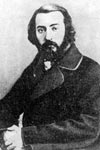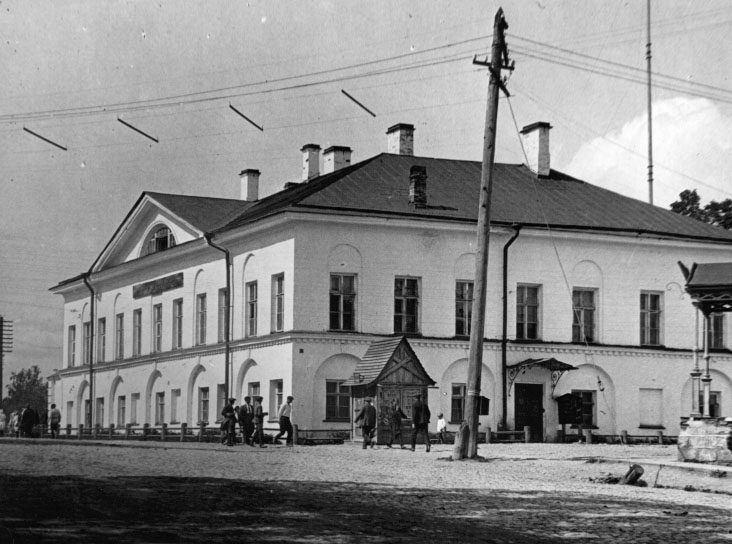Historical InformationThe official year the library was opened is reputed to be 1833. However, the first public library is known to exist in Petrozavodsk as early as the first half of 19th century. We possess scarce information about it. The library obviously existed due to personal readers' donations and to the enthusiasm of its workers ( Nikiforov and Lastochkin for instance ).The library was small at the time - all its bookstock could be stowed on three bookcases; it functioned for 20 years and then vanished without a trace.
In spite of being watched by the police, Rybnikov travelled all over Olonets Region, meeting with people and recording their dialects, runes, songs and tales. He made a great contribution into the Russian culture by publishing "Book of songs collected by P.N.Rybnikov". The library is greatly indebted to this man, its founder and first librarian. Due to his unending efforts the library was subscribed to collected works of the most prominent Russian writers, to ten most well-known magazines of the time and to fifteen Russian and foreign newspapers. The new library ceremoniously opened its doors to the public on January 2,1860. It occupied one of the buildings in Kruyglaya ( Circular ) Square and; existed, like the first one, due to the donations of its readers and wealthy individuals. In 1865 the number of its readers reached 105 people and bookstock contained 887 volumes. After Rybnikov's departure ( to take the post of vice-governer in a small town in Poland ) the library gradually ceased to exist and was revived only thanks to a lucky incident.
Later, though, the library suffered the growing lack of means and many problems connected with the building it occupied.
In 1918 the bookstock of the library is known to contain 40000 volumes, but it was destroyed by the fire in the same year. In 1919 new regional library was established on the basis of libraries of two seminaries and a commercial club.
During the period from 1919 to 1938 the number of readers and bookstock increased considerably. During the Second World War great damage was inflicted to the holdings of the library. Part of them were transported to Finland, the other part was destroyed. After the war scrupulous work on replenishing the bookstock was started.
The library was reopened in 1947.
In 1992 the library got the status of National library of Republic of Karelia. Its present
address is 5, Pushkinskaya Street. It is situated in historical and cultural part of the city. In the neighbourhood there
is a splendid park and embankment of the Onega Lake. Near the library a monument to A.Pushkin was erected in 1966 (sculptor G.Schulz ). It is the favourite place for holding annual Pushkin's
birthday celebrations.
|
 The
new stage of history of the public library in Petrozavodsk is connected with the name of Pavel Rybnikov. He arrived
in Petrozavodsk in 1859 - a good-looking, well-educated young man, former student of Moscow University. Politically
minded like many students of that time, he cherished democratic ideas and was inclined to study the life of common people. To
achieve this goal Rybnikov and his comrades used to put on peasants' clothes and travel along the roads of Russia, studying people's life and collecting
folklore. They were usually followed by the police and during one of his travels Rybnikov was arrested and sent into exile to Olonets Region ( Karelia ). There he lived for six years
and worked for Olonets Civil Governer.
The
new stage of history of the public library in Petrozavodsk is connected with the name of Pavel Rybnikov. He arrived
in Petrozavodsk in 1859 - a good-looking, well-educated young man, former student of Moscow University. Politically
minded like many students of that time, he cherished democratic ideas and was inclined to study the life of common people. To
achieve this goal Rybnikov and his comrades used to put on peasants' clothes and travel along the roads of Russia, studying people's life and collecting
folklore. They were usually followed by the police and during one of his travels Rybnikov was arrested and sent into exile to Olonets Region ( Karelia ). There he lived for six years
and worked for Olonets Civil Governer.
 During
his visit to Petrozavodsk in 1870, Great Prince Alexei donated 300 roubles to the foundation of public library in the city.
In honour of this event the newly established library was given the name "Alexeyevskaya". Its catalogue, dated back to 1872, has been preserved.According to it, the library stock at that time contained 1047
books in different fields of knowledge.
During
his visit to Petrozavodsk in 1870, Great Prince Alexei donated 300 roubles to the foundation of public library in the city.
In honour of this event the newly established library was given the name "Alexeyevskaya". Its catalogue, dated back to 1872, has been preserved.According to it, the library stock at that time contained 1047
books in different fields of knowledge.